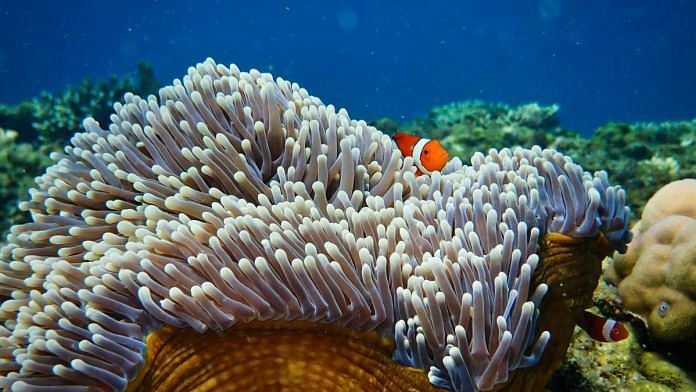New Delhi: There may be hope for restoring the damaged Great Barrier Reef in Australia as scientists have found that playing sounds of healthy coral reefs can attract fish, thus offering a way to potentially start the recovery of degraded reefs.
Fish are extremely important for coral reefs to function as healthy ecosystem.
The research was published in the journal Nature Communications on 29 November.
Writing in the journal, scientists, including those from the UK’s University of Exeter and University of Bristol and Australia’s James Cook University, said the “acoustic enrichment” could be a valuable tool in helping restore damaged coral reefs.
About the experiment, the researchers wrote they placed underwater loudspeakers playing sounds of healthy reefs in some patches of dead coral in the Great Barrier Reef. This went on for 40 days, following which, the scientists found that twice as many fish arrived and lived on the patches where those sounds were played.
Also read: Surviving climate change, these super corals can handle acid, heat and suffocation
How fish help in the recovery of dead coral reefs
The new technique works by regenerating the sounds that are lost when reefs are quietened by degradation.
“Boosting fish populations in this way could help to kickstart natural recovery processes, counteracting the damage we’re seeing on many coral reefs around the world,” said Tim Gordon of the University of Exeter in a statement.
“Healthy coral reefs are remarkably noisy places — the crackle of snapping shrimp and the whoops and grunts of fish combine to form a dazzling biological soundscape. Juvenile fish home in on these sounds when they’re looking for a place to settle,” said Steve Simpson, also from the University of Exeter.
Simpson further said that reefs become “ghostly” quiet when they are degraded as shrimp. “But by using loudspeakers to restore this lost soundscape, we can attract young fish back again,” he added.
But attracting fish to dead reefs won’t bring them back to life automatically as recovery will begin when the fish start cleaning the reefs and create space for corals to regrow, said Mark Meekan of the Australian Institute of Marine Science, one of the researchers.
Sound most effective means of communication under water
The researchers found that broadcasting sounds of healthy reefs not only doubled the number of fish arriving onto the patches where those sounds were played, but even the diversity of the species went up by 50 per cent.
This diversity included species from all sections of the food web — herbivores, detritivores, planktivores and predatory piscivores.
Herbivores are those that eat only plants, while detritivores obtain nutrients by feeding on decomposing plants or animal parts. Planktivores are those that feed on zooplankton and phytoplankton, and piscivores are animals that primarily eat fish.
Different groups of fish provide different functions on coral reefs, which means an abundant and diverse fish population is an important factor in maintaining a healthy ecosystem.
Professor Andy Radford from the University of Bristol said that acoustic enrichment is a promising technique for management of marine ecosystems on a local basis if it is combined with habitat restoration and other conservation measures.
“However, we still need to tackle a host of other threats including climate change, overfishing and water pollution in order to protect these fragile ecosystems,” he added.
According to the National Oceanic and Atmospheric Administration, noise from human activities has been disrupting marine animals and ecosystems since over the last century.
As sound is the most efficient means of communication under water, many aquatic animals use sound to find prey, locate mates and offspring, avoid predators, guide their navigation and find habitat.
Human activities such as shipping, recreational boating and energy exploration create noise that travels long distances under water, reducing an ocean animal’s ability to hear environmental cues that are vital for survival.
If the technique to enhance the sounds of natural reefs is successfully replicated on a larger scale, it could prove to be a vital tool to undo the damage caused by human activities.
Also read: ‘State of planetary emergency’: Global climate tipping points seen in fresh warning



